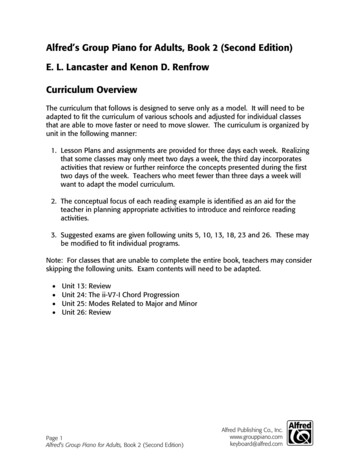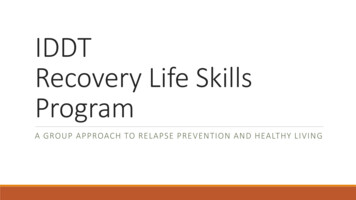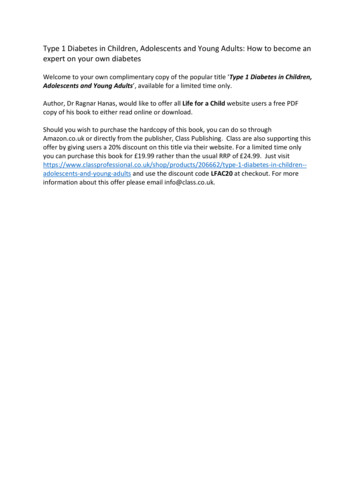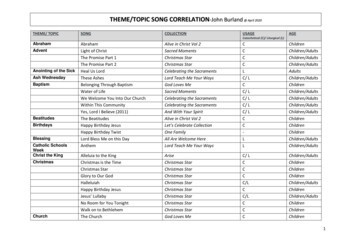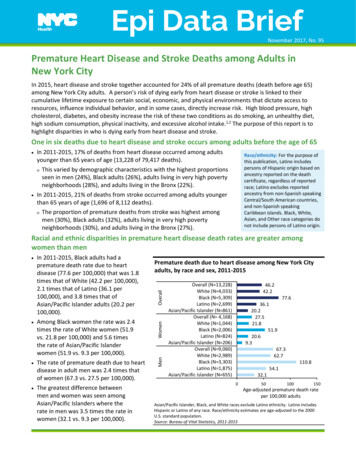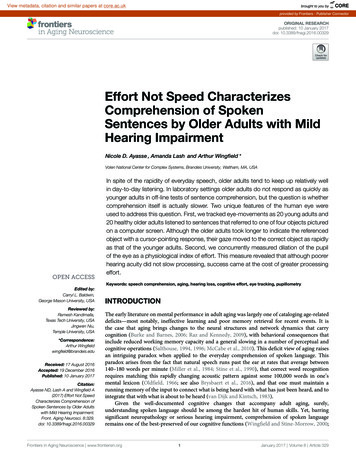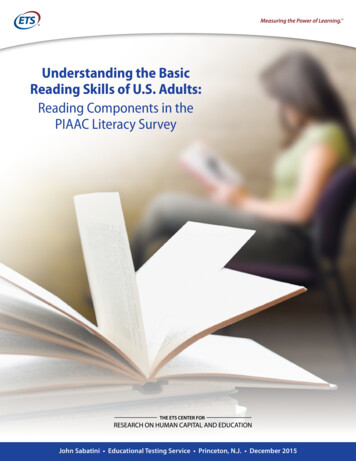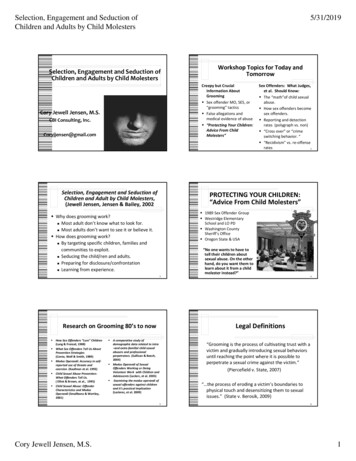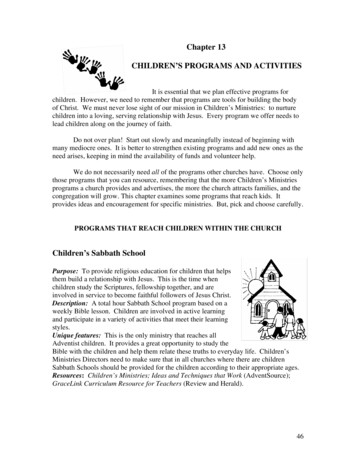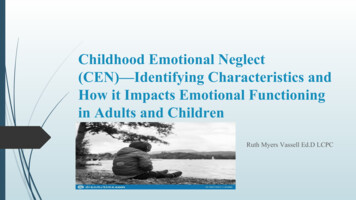
Transcription
Childhood Emotional Neglect(CEN)—Identifying Characteristics andHow it Impacts Emotional Functioningin Adults and ChildrenRuth Myers Vassell Ed.D LCPC
AgendaIntroductionDefinition of CENCEN QUIZDiagnosisAffects on ChildrenAffects on AdultSigns of CENParenting StylesTreatment ModalitiesResourcesPlease feel free to put questions in the chat and I will try and address as we goalong with the presentation. I will also leave time at the end of the presentationfor questions. No-Judgement
Training OverviewChildhood emotionalneglect occurs whena child's parentor parents fail to respondadequately to their child'semotional needs. Over time,the child begins to learn thattheir emotional needs are notimportant.This is importantbecause it impacts achild’s emotionalfunctioning intoadulthood and mayimpact many aspectsof a child’sdevelopment.*
CENEmotional neglect is a consistentpattern of failing to meet theemotional needs of a child
Takea moment and reflect: *What do you remember from childhood?
Why is this so problematic? Howdoes this affect us in adulthood?Because when you are shown that your emotions don’tmatter or that emotions are invisible or unimportant aseparation from emotions may develop and cause strugglesthrough the adult life *.
Why this topic?* B/c many of us tend to parent as we were parented* We may need reprogramming* We are examining this topic based on your experiences-Butalso so you can reflect and look back and think about how yourespond to your children and their emotional needs
Symptoms of CENLow self-esteemDifficulty regulatingemotionsInability to ask for oraccept help or supportfrom othersHeightened sensitivityto rejectionDifficulty withexpressing your wantsand needs to othersLack of language fordescribing feelingsDissociative tendenciesShame or guilt aroundemotionsDifficulties with bonding withothersFeeling empty duringemotional times
How is it diagnosed?Emotional neglect can be difficult to identifybecause children who are emotionally neglectedcan present as healthy children, with their physicalneeds being met and sometimes evenexceeded. School aged children and adolescentsmay be more shut down and less likely to ask forhelp or draw attention to themselves in school.They may appear independent and self-sufficientbut may also struggle to relate to peers and maynot have many close friends.
How do I know if I experienced CEN as achild?1. Sometimes feel like you don’t6. Often just want to be left alone ?belong when with your family orfriends ?7. Secretly feel that you may be afraud ?2. Pride yourself on not relyingupon others ?8. Tend to feel uncomfortable insocial situations ?3. Have difficulty asking for help ?9. Often feel disappointed with, orangry at, yourself ?4. Have friends or family whocomplain that you are aloof ordistant ?5. Feel you have not met yourpotential in life ?10. Judge yourself more harshlythan you judge others ?
How do I know if I experienced CEN as achild?11. Compare yourself toothers and often findyourself sadly lacking?16. Sometimes feel likeyou’re on the outsidelooking in ?12. Find it easier to loveanimals than people ?17. Believe you’re one ofthose people who couldeasily live as a hermit ?13. Often feel irritable orunhappy for no apparentreason?14. Have trouble knowingwhat you’re feeling ?15. Have troubleidentifying your strengthsand weaknesses?18. Have trouble calmingyourself ?19. Feel there’s somethingholding you back frombeing present in themoment?20. At times feel emptyinside ?
How do I know if I experienced CEN as achild?21. Secretly feel there’ssomething wrong withyou ?22. Struggle withself-discipline ?Look back overyour YES answers. Theseanswers give you a window intothe areas in which you mayhave experienced EmotionalNeglect as a child. The morequestions you answered "Yes",the more likely CEN hasaffected your life.
How does CEN affect children?The child must feeldeeply seen andemotionally validated toescape the effects of CENEmotional neglect inchildhood leads to higherrisk of anxiety disordersin adolescence andadulthood.People who experiencedemotional neglect aschildren can strugglewith relationshipsthroughout life *
How does CEN affect children?Children learn that theiremotions are not okayInability to ask for help(in school or otherwise)Shutting down becomesan adaptive behaviorEmotional distress maypresent through somaticcomplaints — headaches,stomach problems, etc.Lashing out can become away to try to be heard ornoticedDifficulty in connectingwith peers can bepersistent
Other affects on childrenDifficulty maintainingrelationshipsRelationships that aredistant or disconnectedInability to deal with emotionsof self or othersDistrust of othersDissociative or shutting-downbehaviors2Inability to ask for helpPersistent feelings ofloneliness, guilt, orshameSabotaging relationships oropportunities in order toavoid rejectionHeightened risk of anxietydisorders and depressivedisorders3Emotional reactivity*
Types of Parenting and theireffects on childhood emotions
Ordinary Healthy Parent* The parent feels an emotional connectionto the child.* The parent pays attention to the child andsees him as a unique and separate person,rather than, say, an extension of him orherself, a possession or a burden.
Emotionally NeglectfulParenting---TypesParents who are overly focused on their child's achievements,intelligence, or appearance are more likely to neglect their child'semotional needs. Living through their child Drawing attention to themselvesProblem here is that the child must feel deeply seen andemotionally validated to escapes affects of CEN.
Parenting TypesAuthoritarian parents wanttheir children to follow therules,Perfectionistic parents tendto believe their children canalways do more or better.Permissive parents have alaissez-faire attitude aboutchild rearing and may letchildren pretty much fend forthemselves.Absent parents can beremoved from a child’s lifefor a variety of reasons, suchas death, illness, divorce,working long hours, orfrequent travel for work.Parents with narcissisticqualities feel the worldrevolves around them.The addicted parent:Focus is on compulsivebehaviors. There arerange of addictions butchildren of addictedparents feel the lack ofpredictability ashigh-anxiety provoking
Parenting TypesThe depressed Parent: Littleenthusiasm for the job ofparenting.The workaholic parent: Workaholicparents are often driven and verysuccessful people but unfortunatelytheir children often suffer in silence.The parent with special needs familymember: Generally stretched thinThe sociopathic parent: thisparent feels not guilt.The child as a parent: Theparent allows, encourages orforces child to behave as ifthey are the parentThe well-meaning butneglected themselves parent:Wants to be a great parenttries very hard but hasdifficulty being aware andunderstanding emotions.
Check inClarity:emotional neglect vs. emotional abuse:(difference between knocking a plant off thestand or not watering it).
Affect on Adult Functioning-10 Ways *Feelings of emptinessCounter dependenceUnrealistic self appraisalNo compassion forself-plenty for othersGuilt and shame; what iswrong with meSelf directed anger,self-blameThat fatal flaw (if peoplereally know me they wontlike me)Difficulty nurturing selfand othersPoor self-disciplineAlexithymia: Poorawaremeness andunderstanding ofemotions.
Why is this so important/Problematic—You cantgive your kids what you didn’t getYou can’t giveyour kids whatyou didn’t getButtttttttttt —
How can we help our children?Focus on the child’s feelingsinstead of their behavior.Emotions drive behavior.
Treatment:How do we move forward and replenishwhat was lost and recover some missingpieces?
Now What? Recovery—Reclaiming your own emotions and starting tomake more emotionally validating connections with children and others.5 stepsTherapyFamily TherapyParenting ClassesSelf-ReflectingEmotional Building
10 Strategies For Coping With Your ChildhoodEmotional NeglectDeeply acknowledge the wayEmotional Neglect happenedin your family and how it’saffected you.Accept that your emotionsare blocked off, but they arestill there, waiting for you.Pay attention to yourfeelings.Practice sitting with negativefeelings to increase yourtolerance.Keep an ongoing list of yourLikes and Dislikes.Develop and practicecompassion for yourself.Become aware of the feelingof anger when it happens inyour body.
10 Strategies For Coping With YourChildhood Emotional NeglectWork on assertivenessShare your CEN storywith someone close toyou.Look for the effects ofCEN on your primaryrelationships.
ResourcesBooks:*Running on Empty by Jonice Webb*Running on Empty No More By Jonice Webb*The Body Keeps the Score: Bessel Van Der Kolk, M.D*The Emotionally Absent Mother, Updated and Expanded Second Edition: How toRecognize and Heal the Invisible Effects of Childhood Emotional NeglectCori MS LPC, Jasmin LeeWork Books*Repeat After Me by Claudia Black PhD.*Tru You by Kelly Vincent PsyD.*The Self Confidence Workbook: A Guide to Overcoming Self-Doubt andImproving Self-Esteemby Barbara Markway PhD , Celia Ampel , et al
Questions?
Childhood emotional neglect occurs when a child's parent or parents fail to respond adequately to their child's emotional needs. Over time, the child begins to learn that their emotional needs are not important. This is important because it impacts a child's emotional functioning into adulthood and may impact many aspects of a child's
